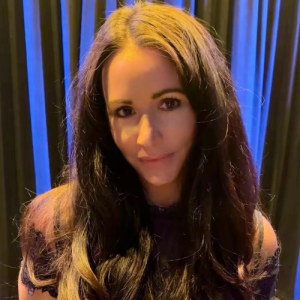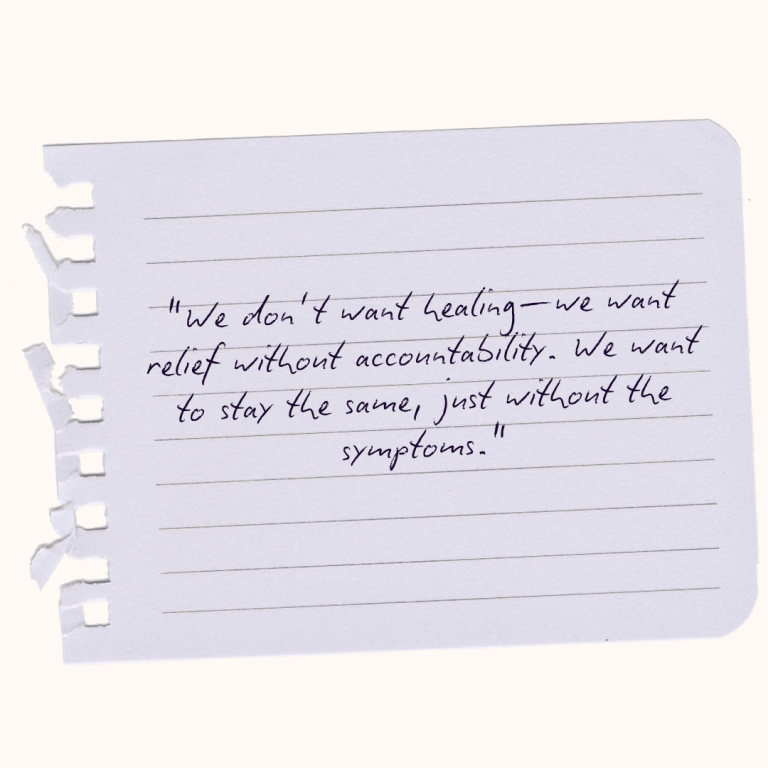I’ll Do the Work — As Long As I Don’t Have to Change


Paige Elizabeth
Founder and Coach
The Modern Nervous System’s Favorite Lie

We love the idea of healing — as long as it doesn’t cost us our familiar chaos.
We say things like:
“I’ll do the diet, as long as I don’t have to feel hunger.”
“I’ll slow down, as long as it doesn’t affect my productivity.”
“I’ll rest, as long as I don’t have to confront why I can’t relax.”
“I’ll face my trauma, as long as it doesn’t make me feel anything uncomfortable.”
“I’ll regulate my nervous system, as long as I can keep living dysregulated.”
We want peace, but what we actually mean is:
“I want the appearance of peace while maintaining the same habits, beliefs, and coping mechanisms that keep me in survival mode.”
We don’t want healing — we want relief without accountability.
We want to stay the same, just without the symptoms.
The Nervous System’s Bargain
This is how the nervous system negotiates with itself:
“I’ll heal… if you promise it won’t hurt.”
“I’ll surrender… if I can keep control.”
“I’ll rest… if I can stay productive.”
But that’s not surrender — that’s survival disguised as self-awareness.
Healing Isn’t Something You “Do”
It’s something that happens when the part of you performing finally stops.
When you stop chasing optimization and let your body tell the truth.
When the identity built on control, achievement, and proving collapses under its own exhaustion.
Healing requires loss:
Loss of the identity that was built to survive pain.
Loss of the rush of being needed, admired, or productive.
Loss of the illusion that you can think your way to safety.
That’s why most people never cross the threshold.
They want to feel better, not become different.
They want to change their circumstances, not their consciousness.
The New Religion of Labels
Here’s the uncomfortable truth:
People would rather have a label for their dysfunction than a solution for their suffering.
“I have anxiety.”
“I’m in perimenopause.”
“I have adrenal fatigue.”
“I have attachment issues.”
Labels give the illusion of understanding — but they don’t demand transformation.
They offer identity without accountability.
Once we can name our pain, we think we’ve done the work.
But naming it isn’t healing it.
We confuse language for liberation.
We think insight is embodiment.
So we join support groups, buy supplements, and share self-diagnoses online — and call it awareness.
But the body doesn’t care what you call your dysfunction.
It only cares whether you’re willing to live differently.
The Paradox of Modern Healing Culture
We buy supplements, chase biohacks, hire coaches, and download meditation apps — all to keep the illusion that we’re “doing the work.”
But the underlying agreement never changes:
“I’ll do all this work as long as I don’t have to stop hustling, performing, or controlling.”
The wellness industry thrives on this contradiction.
It keeps people buying relief instead of embodying change.
But the nervous system doesn’t lie.
You can’t out-hack dysregulation with products or productivity.
You either slow down voluntarily — or your body will do it for you.
Real Healing Is Repatterning
When I say “healing,” I’m not talking about fixing yourself.
I’m talking about repatterning your relationship to safety, pace, and power.
It’s when you stop identifying with the version of you that’s always doing and finally make space for the one that’s allowed to be.
That’s when you stop needing external permission to rest.
That’s when you stop outsourcing your worth.
That’s when you stop bargaining with your body and start partnering with it.
Healing Doesn’t Happen on Your Terms
It happens when your nervous system finally stops negotiating.
When you allow the grief, fear, boredom, and emptiness you’ve been running from.
When you meet stillness — not as a reward, but as a reclamation.
Healing asks:
“Are you willing to stop performing long enough to meet yourself?”
Because that’s the real edge — not the next detox, course, or fix.
It’s the willingness to sit in the silence of who you’ve become and say:
I’m not doing this anymore.
The Invitation
If you find yourself saying,
“I want to be regulated,” but refuse to slow down —
“I want to feel peace,” but won’t release control —
You’re not broken.
You’re just afraid that if you stop running, there will be nothing left of you.
But that’s the lie.
What’s left after the collapse is you.
Not the performer.
Not the achiever.
Not the one who’s been holding it together.
Just the one who’s finally ready to live.
And that’s where the work begins.
This is the foundation of my work inside When Women Speak, They Heal — teaching women to stop identifying with their dysfunction and start living from regulation.
Ready to stop performing and start living from regulation?
Stop bargaining with your body and commit to true repatterning.
Learn more about the program and book your spot for ‘When Women Speak, They Heal’ today.
